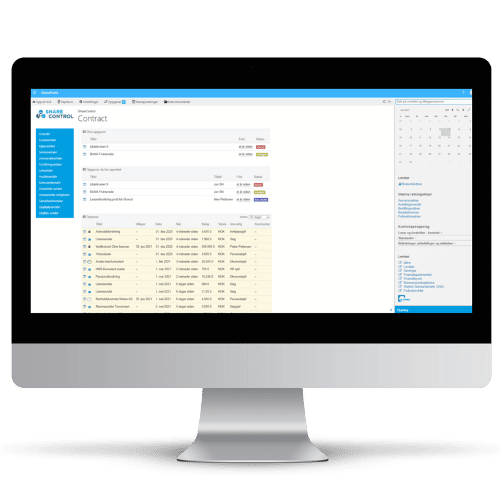What is the Transparency Act?
The Transparency Act is a Norwegian law that entered into force on 1 July 2022. The law obliges medium-sized and larger businesses to map the risk of human rights violations throughout their supply chain. The law also requires the businesses to report on the findings and to rectify any damage. The purpose of the act is to promote companies’ respect for basic human rights and decent working conditions, and to ensure the public’s access to information.
In line with increased consumer awareness and demands, several Norwegian organisations, including Future in our hands, and the authorities have jointly created the Norwegian Transparency Act. Planning for the Transparency Act already started back in 2016, when the Storting asked the government to investigate and assess a law regarding transparency about production sites and ethics information. In 2021, the act was passed by the Storting and was put into effect from 1. July 2022. In this article, you can read what is required under the Act on the Transparency of Businesses and Work with Basic Human Rights and Decent Working Conditions (Legislative data: Transparency Act).
Who is covered by the legislation?
The Tranparency Act obliges medium-sized and larger businesses domiciled in Norway to comply with the requirements of the legislation. Foreign businesses that offer goods and services in Norway and that are liable to tax in Norway according to Norwegian internal legislation are also liable.
Businesses that are covered by Section 1-5 of the Accounting Act, or exceed the limits for two of the following three conditions, are covered by the Transparency Act:
- Revenue: NOK 70 million
- Balance amount: NOK 35 million
- Average number of employees in the financial year: 50 man-years
Even if a business is not covered by the law, some of the business’ customers or suppliers may be. The business must then be prepared to provide information about its own supply chain if the customer requests it in order to fulfill its own obligations under the law.
Companies that do not offer goods or services
There are several companies which are liable to tax in Norway, but which do not supply goods or services and are therefore not covered by the law. These can, for example, be holding companies which, in accordance with the points above, exceed sales income of over NOK 70 million and a balance sheet total of NOK 35 million. In section 2 of the Act, it is stated that one must offer goods or services to be covered. The holding company in this case will therefore not be covered by the law, as they do not offer goods or services.
What is your duty?

The Transparency Act requires businesses to carry out due diligence assessments of their suppliers, publish an annual report, and provide information to anyone who makes a written request about it. The deadline is within 30 June each year. The public can still get in touch throughout the year to get information after the reporting deadline.
Why is the Transparency Act important?
Overall, the Transparency Act contributes to increased transparency, accountability and awareness of basic human rights and decent working conditions in the business world. This can lead to more sustainable and ethically responsible businesses and better protection of workers and communities affected by their activities. Some of the benefits are:

Promote basic human rights and decent working conditions:
The aim of the Act is to increase companies’ respect for basic human rights and decent working conditions. This can help prevent or limit the risk of negative impacts on human rights and poor working conditions in supply chains and businesses.
Increased information and insight:
The Transparency Act ensures the public access to information about how businesses handle actual and potential negative consequences related to their business. This can contribute to increased awareness and commitment from both customers, investors and other stakeholders.
At the same time, the Act requires that the businesses publish the information about due diligence assessments and measures taken to reduce the actual or potential negative consequences. In this way, the Transparency Act contributes to increased accountability and trust in relation to their business practices.
Download guide for the Transparency Act
Get an insight into all the functions and processes that can help you deal with the Transparency Act. We have created a complete guide that takes you from anchoring in the board to due diligence assessments, risk assessment and reporting.
Get the guide in your inbox

Basis of decision
When information about companies’ responsible practices is available, both customers and investors can make more informed decisions about which companies they want to support or invest in.
The steps in the Transparency Act
The Transparency Act gives businesses 3 main obligations that we mentioned earlier in the article. The duties are again divided into several tasks that require a lot of time from the companies. We therefore recommend spending plenty of time handling due diligence assessments and preparing for any information requirements. The law can be broken down into the following steps:

Anchor accountability
The first step in the Transparency Act (originally in the due diligence assessments) starts with the business defining internal guidelines. In the Transparency Act, this means that overall goals are set for how negative consequences are to be avoided and how any damage is to be prevented. Concrete actions the business undertakes to take in the event of various findings should also appear in the document.
Read more about how to anchor accountability here.
The company’s guidelines must be in line with the Transparency Act and OECD guidelines. This means that you can update your existing guidelines, or develop new ones with regard to the Transparency Act. The guidelines must cover the entire business, the supply chain and business partners.
The guidelines must contain at least:
- How the business must act responsibly
- Responsibility expectations of suppliers and business partners, and
their due diligence plans
Anchoring accountability is written in §4, letter a of the Transparency Act.
Due diligence assessment
Due diligence assessments are a methodology that helps to map, prevent and follow up businesses’ potential and actual negative impact on human rights and decent working conditions. These assessments, which must be carried out both internally and externally, focus on identifying breaches of both our own and our suppliers’ practices, as well as external factors that affect human rights and working conditions.
The business itself is responsible for the findings and explanation of due diligence assessments that are published on the business’s website.
The OECD’s guidelines for multinational companies form the basis for these assessments, which aim to ensure responsible business and deal with negative consequences for basic human rights. Practical implementation of due diligence assessments involves six steps:
- Anchoring accountability: Defining accountability in the company’s guidelines in line with legislation and OECD guidelines.
- Mapping negative consequences: Analysis of the company’s and suppliers’ practices to identify risks and halt, prevent or limit negative consequences for basic human rights and decent working conditions.
- Take measures: Implement measures to stop, prevent and manage identified risks, with a focus on prevention rather than reaction.
- Follow up the measures: Evaluate the effectiveness of implemented measures and make any adjustments.
- Communicate with affected stakeholders: Inform affected parties about measures and results of the due diligence assessments.
- Restore: If the business is directly involved in negative consequences, implement restorative measures such as compensation, compensation or sanctions.
By following these steps, businesses meet the requirements of the Transparency Act and contribute to a responsible and sustainable business life.
Initiate action
Implementing measures is part of the due diligence (step 4) and one of the purposes of the Transparency Act. Taking action when companies violate human rights and decent working conditions is essential to ensure that individuals and communities are protected from harm. This helps to create a culture and promote companies’ respect for human rights and encourages companies’ openness and work and anchors responsibility in the company’s management.

The Norwegian Consumer Protection Authority provides the basis for three levels of measures under the Transparency Act:
- Preventive measures
- Restrictive measures
- Stopping measures
Report
The Transparency Act imposes on businesses an annual annual report, or reporting obligation as the law defines it as. A report under the Transparency Act is a document that businesses must make public by 30 June each year on their websites.
An account of the due diligence assessments must provide insight into the due diligence assessments that the business has carried out and present the potential negative consequences that have been found and the measures that have been initiated.

Reporting due diligence assessments must contain three main elements:
- General description of the business, including organisation, operating area, products/services, markets, and how the work with human rights and working conditions is anchored in internal guidelines and routines.
- Information on actual negative consequences and significant risk of such consequences found in the due diligence assessments. This includes descriptions of concrete negative consequences and risk areas, as well as assessments of severity and probability.
- Description of measures that have been implemented or are planned to stop actual negative consequences and limit risk. This involves reporting on implemented measures and their results.
The statement must be signed in line with the Accounting Act § 3-5 (Statutory data) on signing annual accounts and annual report.
–Forbrukertilsynet, Redegjørelse
The report must be signed by relevant persons and be easily accessible on the company’s website. It must be updated annually and in the event of significant changes in the risk assessments. Parent companies must also include assessments of the subsidiaries’ activities. Companies in the group can choose to prepare a joint statement, but the requirements for content and formal requirements must still be met for each individual company in the group.
Information requirements
The Openness Act is a unique law that gives the general public the right to request information from businesses about the company’s handling of human rights and working conditions in the supply chain. The information requirement gives everyone the right to request such information through written contact with the business, either via e-mail, letter or online forms. Businesses are required by law to respond to these inquiries within three weeks, with comprehensive and comprehensible answers.
Businesses must respond to information requests as soon as possible, and no later than 3 weeks from receiving the request.
The minimum requirements for the information requirement include an explanation of the board’s responsibilities and guidelines, as well as specific measures in the event of negative consequences for basic human rights and working conditions. The information must also include the findings of due diligence assessments, without revealing the identity of the suppliers. The businesses can reject claims that are incomprehensible or unreasonable, but should refer to publicly available information if possible.
Read more about information requirements under the Transparency Act here.
Who can request information?
Companies must be prepared to respond to information requests from the general public, customers, investors or other stakeholders who want to know more about how the business handles actual and potential negative consequences identified through the due diligence process.
Violation of the Transparency Act
It is the Norwegian Consumer Protection Authority that has been tasked with supervising under the Transparency Act. In the first year of the Transparency Act, the supervisory authority provided guidance and help with the legislation, but announced in the autumn of 2023 that they would start inspections.
After the Norwegian Consumer Protection Agency carried out a survey of Norwegian businesses’ handling of the legislation at the end of 2023, it emerged that one in five businesses lacked a public statement on their website. We therefore recommend that everyone familiarize themselves thoroughly with the requirements of the legislation.
Although the Norwegian Consumer Protection Authority has mainly emphasized guidance in the first year since the law came into force, it is nevertheless important to stress that we will crack down on extensive and obvious breaches of the law’s provisions. Businesses that have not proven their responsibility, and do not comply with the law, risk sanctions.
Trond Rønningen, director of the Norwegian Consumer Protection Authority
Similar international laws
Several international laws share similarities with the Transparency Act by promoting corporate accountability and transparency in terms of human rights and environmental impacts:
German law on supply chain due diligence assessments
Gesetz über die unternehmerischen Sorgfaltspflichten in Lieferketten is a German law that requires large companies to carry out due diligence assessments in their supply chains to identify and manage risks related to human rights and the environment. It aims to prevent violations such as child labour, forced labor and environmental damage.
French law on vigilance (Plan of vigilance)
The law requires large companies to create and implement plans to identify and prevent violations of human rights and the environment throughout their supply chains. Companies must regularly report on their vigilance measures.
English law against slavery and human trafficking
The UK Modern Slavery Act requires companies to disclose the measures they have taken to ensure that slavery and human trafficking do not take place in their supply chains and operations. Although the main focus is on modern slavery, it contributes to wider corporate responsibility and transparency.
The introduction of the EU’s: Corporate Sustainability Due Diligence Directive (CSDDD)
The Corporate Sustainability Due Diligence Directive is a new EU directive which aims to promote sustainable and responsible business practices among large companies within and outside the EU. While the Transparency Act and the Corporate Sustainability Due Diligence Directive (CSDDD) both aim to improve corporate accountability, there are differences in scope and specific requirements:
- The Transparency Act: Focuses on human rights and decent working conditions, and applies to larger Norwegian companies and foreign companies operating in Norway. The Transparency Act, however, has a lower duty limit than the CSDDD.
- CSDDD: Covers a wider range of issues, including environmental impacts and climate action plans, and applies to large EU-based companies and non-EU companies with significant turnover in the EU.
Differences in reporting and compliance
The Transparency Act requires businesses to publish an annual report of their findings and measures taken to stop, limit or prevent negative consequences on basic human rights. It is the Norwegian Consumer Protection Authority that supervises and can impose sanctions in the event of a breach of the law.
In the international CSDDD, the reporting requirements are more comprehensive and include mandatory climate action plans and regular updates on precautionary measures. The directive also requires EU member states to establish national supervisory authorities to ensure compliance. In contrast to the Transparency Act, the CSDDD requires the member states to establish supervisory authorities that can impose fines and sanctions.
It is expected that the Transparency Act will be amended in the future to include several of the requirements in the CSDDD.
What you should do in your business now!
On the Norwegian Consumer Protection Authority’s website, you can read more about how to get started with due diligence assessments under the Transparency Act and what measures you should take now.
The Norwegian Consumer Protection Authority recommends businesses to start with these points:
- Anchor accountability in the board: It is crucial to anchor accountability in the board, which must adopt a plan for due diligence assessments and publication of reports in line with the law.
- Guidelines and corporate culture: Establish guidelines that comply with the Transparency Act and communicate these internally to integrate them into the corporate culture.
- System for handling the obligation to provide information: Establish an effective system for handling written requests for information and ensure that the business can respond within three weeks.
- Mapping: Start the mapping of both internal conditions and supply chains without waiting, as this can be a time-consuming process.
- Risk analysis: Carry out a thorough risk analysis to identify potential violations of human rights and decent working conditions both internally and with suppliers.
ShareControl Transparency – Software for the Transparency Act
ShareControl Transparency offers a solution tailored for businesses that want to meet the requirements of the Transparency Act in an efficient and secure way. Built on Microsoft Power Apps, ShareControl Transparency provides an intuitive user experience and enables seamless integration with a variety of platforms, including Microsoft 365, Power BI and Dynamics 365.
With the system, businesses can easily store data related to basic human rights and decent working conditions in accordance with the requirements of the Norwegian Openness Act. Through tools such as Forms and Customer Voice, ShareControl Transparency also provides the opportunity to send out questionnaires in connection with due diligence assessments, as well as generate automated reports based on collected data. With ShareControl Transparency, compliance with legislation and ethical practice becomes a seamless part of the company’s operations.
ShareControl Transparency
Software for «the Transparency Act»
A complete system for the Transparency Act for handling all the company’s data and processes related to the Transparency Act.







